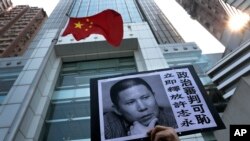HONG KONG —
In a widely anticipated move, a court in China upheld a four-year jail term given to legal scholar Xu Zhiyong for his political activism. Xu is the founder of a transparency movement that has pressed officials to disclose their assets. His detention and prison sentence have drawn international criticism.
Xu Zhiyong had been found guilty in January of gathering a crowd to disturb public order.
His appeal, rejected on Friday by the Beijing Intermediate People's Court, is the last legal recourse in his case.
Xu, who now faces four years in prison, called the ruling “ridiculous” and told the court Friday that “the haze of Communist autocracy will fade away.”
Xu's lawyer Zhang Qingfang said that although he expected a rejection, he had maintained hope that the members of the court would use this appeal as an opportunity to correct their earlier mistake. He said that the court had a very good opportunity but did not take it; a misjudgment on their part.
A well-respected scholar of law, Xu Zhiyong has spent the last decade championing a moderate approach to political reform in China.
More recently, together with other members of a loosely organized group called the New Citizens Movement, he had been advocating for better measures to fight corruption among officials, increase transparency, and guarantee equal access to education and jobs.
The group held regular meetings to discuss politics and some members organized small scale demonstrations around the country.
Prosecutors who charged him in 2013 said Xu Zhiyong used the issue of asset disclosure and education equality to gather hundreds of people in different rallies and create chaos in the streets of Beijing.
Human rights groups maintain that Xu's only "crime" is to have exercised his constitutional right to free speech.
On Friday, Amnesty International called the court's decision to reject Xu's appeal shameful and hypocritical.
Xu's case is the first high-profile trial of an activist under Xi Jinping's leadership. Analysts have highlighted a contradiction between Xi's stated resolve to fight corruption and inequality, with his treatment of grassroots groups who are championing the same things.
Prominent human rights lawyer Teng Biao called the prosecution against Xu Zhiyong “completely unjust,” but thinks it will not have the effect that authorities hope for. He said the government's intense methods, which might scare some people away, will for the most part act as a wake-up call for people to understand the problems within the system. Teng predicted that more people will protest.
The government's prosecution against the New Citizens Movement includes trials against other less high-profile members. Last week, two other activists were tried in Beijing, and another four will stand trial on Monday.
An official website launched by members of the group on Friday is not accessible in China, where authorities strictly police the Internet and censor sensitive political material.
Xu Zhiyong's autobiography was also published on Friday in Hong Kong.
Xu's lawyer Zhang Qingfang says that the jail term will not scare Xu away from politics. Zhang said Xu will have the next few years free of interference to think about the future of his country.
Xu Zhiyong had been found guilty in January of gathering a crowd to disturb public order.
His appeal, rejected on Friday by the Beijing Intermediate People's Court, is the last legal recourse in his case.
Xu, who now faces four years in prison, called the ruling “ridiculous” and told the court Friday that “the haze of Communist autocracy will fade away.”
Xu's lawyer Zhang Qingfang said that although he expected a rejection, he had maintained hope that the members of the court would use this appeal as an opportunity to correct their earlier mistake. He said that the court had a very good opportunity but did not take it; a misjudgment on their part.
A well-respected scholar of law, Xu Zhiyong has spent the last decade championing a moderate approach to political reform in China.
More recently, together with other members of a loosely organized group called the New Citizens Movement, he had been advocating for better measures to fight corruption among officials, increase transparency, and guarantee equal access to education and jobs.
The group held regular meetings to discuss politics and some members organized small scale demonstrations around the country.
Prosecutors who charged him in 2013 said Xu Zhiyong used the issue of asset disclosure and education equality to gather hundreds of people in different rallies and create chaos in the streets of Beijing.
Human rights groups maintain that Xu's only "crime" is to have exercised his constitutional right to free speech.
On Friday, Amnesty International called the court's decision to reject Xu's appeal shameful and hypocritical.
Xu's case is the first high-profile trial of an activist under Xi Jinping's leadership. Analysts have highlighted a contradiction between Xi's stated resolve to fight corruption and inequality, with his treatment of grassroots groups who are championing the same things.
Prominent human rights lawyer Teng Biao called the prosecution against Xu Zhiyong “completely unjust,” but thinks it will not have the effect that authorities hope for. He said the government's intense methods, which might scare some people away, will for the most part act as a wake-up call for people to understand the problems within the system. Teng predicted that more people will protest.
The government's prosecution against the New Citizens Movement includes trials against other less high-profile members. Last week, two other activists were tried in Beijing, and another four will stand trial on Monday.
An official website launched by members of the group on Friday is not accessible in China, where authorities strictly police the Internet and censor sensitive political material.
Xu Zhiyong's autobiography was also published on Friday in Hong Kong.
Xu's lawyer Zhang Qingfang says that the jail term will not scare Xu away from politics. Zhang said Xu will have the next few years free of interference to think about the future of his country.









